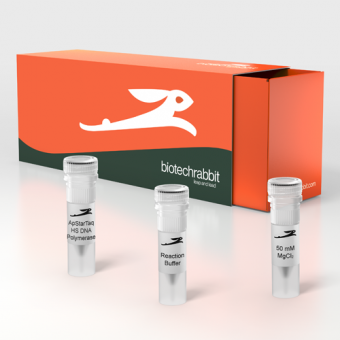Biotechrabbit은 바이오의약품 및 생명과학 연구를 위한 고급 실험 재료와 서비스를 제공하는 회사입니다.

제품 설명
ApStarTaq™ Hot-Start DNA Polymerase, 5 U/µl
제품 번호
BR0201501
제품 특징
Description
biotechrabbit ApStarTaq™ DNA Polymerase is an aptamer based hot-start enzyme and the first-choice for fast PCR reactions. The exceptional quality and purity of the enzyme ensures highest performance, suitable for standard and fast PCR cycling in both, endpoint and real-time assays. It ensures high product yields with low background and without primer–dimer formation or non-specific priming.
The aptamer binds to Taq DNA Polymerase and inhibits the enzyme activity at temperatures below 45°C. This ensures full hot-start functionality. The enzyme is released during standard PCR cycling conditions. There is no need for separate heating or denaturation steps, allowing fast PCR reactions.
Info: Recommended annealing temperature is 2°C above primer Tm (use gradient PCR to optimize the annealing temperature).
Other Information
Component | Composition |
ApStarTaq DNA Polymerase | ApStarTaq DNA Polymerase, 5 U/µl, in storage buffer |
5× Reaction Buffer | Optimized PCR buffer without magnesium ions |
50 mM MgCl2 | 50 mM MgCl2 in water |
STORAGE | −20°C (until expiry date – see product label) |
One unit is defined as the amount of enzyme required to catalyze the incorporation of 10 nmol of dNTP into acid-insoluble form in 30 minutes at 72°C in the presence of the reaction buffer.
Human genomic DNA was amplified using the DNA Polymerase and specific primers to produce a distinct band of 750 bp.
Standard PCR is carried out without primers, using the DNA Polymerase and human genomic DNA. No products were amplified.
Linearized lambda/HindII fragments are incubated with the DNA Polymerase in a 50 µl reaction mixture for 4 h at 37°C. No degradation of DNA was observed.
lambda DNA is incubated with the DNA Polymerase in a 50 µl reaction mixture for 4 h at 37°C. No degradation of DNA was observed.
Supercoiled plasmid DNA is incubated with the DNA Polymerase in a 50 µl reaction mixture for 4 h at 37°C. No conversion of covalently closed circular DNA to nicked DNA was detected.
A sample of the denatured DNA Polymerase is analyzed with specific primers targeting the 16S rRNA gene in qPCR for the presence of contaminating E. coli DNA. No E. coli DNA was detectable.
Protocols
When assembling the amplification reactions, care should be taken to eliminate the possibility of contamination with undesired DNA.
The standard PCR protocol using biotechrabbit reaction buffer provides excellent results for most applications. Optimization might be necessary for certain conditions, such as high GC or AT content, strong template secondary structures or insufficient template purity. In such cases, optimization of template purification (see biotechrabbit nucleic acid purification kits), primer design and annealing temperature is recommended.
The best conditions for each primer-template can be optimized with the following:
If unspecific amplification occurs, the amount of ApStarTaq NA Polymerase and the primer concentration can be reduced. Correspondingly, these can be increased when yield is low.
Many applications use a standard concentration of 2.0 mM MgCl2. However, reactions with aptamer-based hot-start polymerase and/or increased amounts of template (e.g., genomic DNA), primer and nucleotides might require higher MgCl2 concentrations (3–4 mM). A separate 50 mM MgCl2 solution is supplied with the enzyme and can be used to adjust the MgCl2 concentration according to the table below:
Final concentration of MgCl2 in a 25 µl reaction, mM | 2.0 | 2.5 | 3.0 | 3.5 | 4.0 |
Volume of 50 mM MgCl2 solution to add, µl | 1.0 | 1.25 | 1.5 | 1.75 | 2.0 |
Component | Volume | Final concentration |
5× Reaction Buffer | 5 µl | 1× |
50 mM MgCl2 | 1.0 µl | 2.0 mM |
| Do not use less than 2 mM MgCl2. Higher than 2 mM might increase yield but reduce fidelity. | |
10 mM dNTP Mix (BR0600202) | 0.5 µl | 200 µM |
Forward primer | Variable | 0.2–1 µM |
Reverse primer | Variable | 0.2–1 µM |
Template DNA | Variable | 10 pg–1 μg |
| Use 0.01–1 ng for plasmid or phage DNA and 0.1–1 μg for genomic DNA. | |
ApStarTaq DNA | 0.25 µl | 1.25 U (per 25 µl rxn) |
Nuclease free water | Variable |
|
Total volume | 25 µl |
|
| For total reaction volumes other than 25 µl, scale reagents proportionally. | |
Step | Temperature | Time | Cycles |
Initial DNA denaturation | 95°C | 1 min* | 1 |
| * recommended time for denaturation of genomic DNA templates | ||
Denaturation | 95°C | 30 s | 25–35 |
Annealing* | (55-68°C) | 15–30 s | 25–35 |
| *Recommended annealing temperature is 2°C above Tm of primers, | ||
Extension | 72°C | 30–60 s/kb | 25–35 |
Final extension | 72°C | 5 min | 1 |
| To extend all incomplete PCR products | ||
Storage in the cycler | 4°C | Indefinitely | 1 |
Biotechrabbit에서 다양한 제품을 찾아보세요!
Biotechrabbit - Official Distributor in South Korea "Morebio" 한국 공식 대리점 "모아바이오"